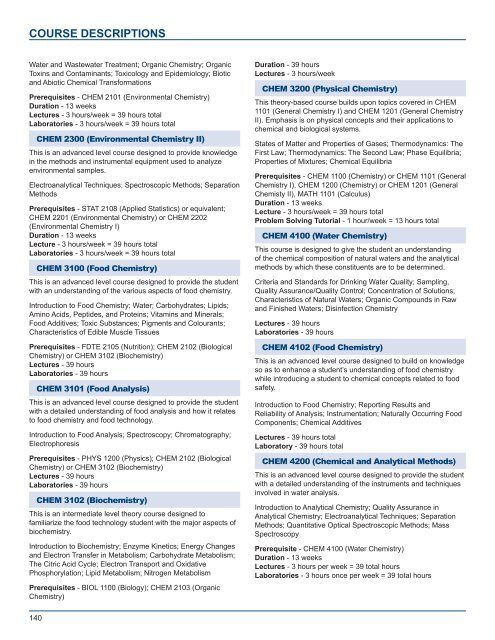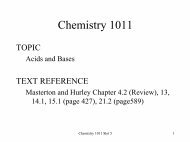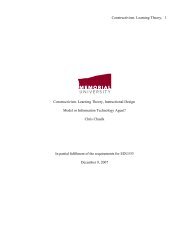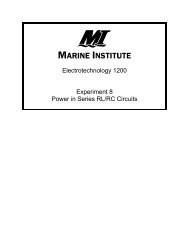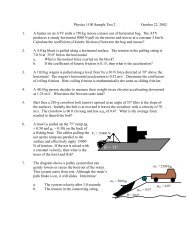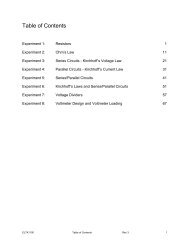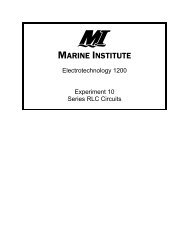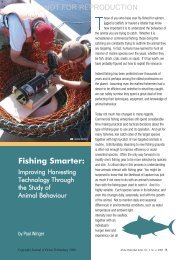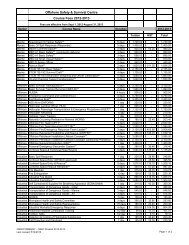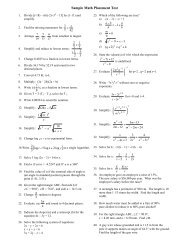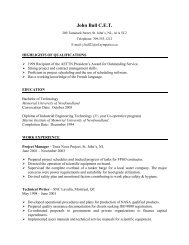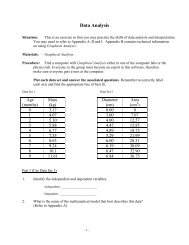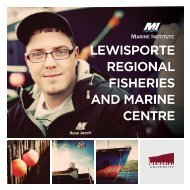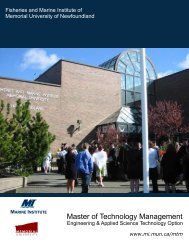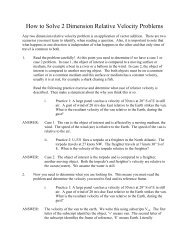Academic Calendar - Fisheries and Marine Institute - Memorial ...
Academic Calendar - Fisheries and Marine Institute - Memorial ...
Academic Calendar - Fisheries and Marine Institute - Memorial ...
Create successful ePaper yourself
Turn your PDF publications into a flip-book with our unique Google optimized e-Paper software.
COURSE DESCRIPTIONS<br />
Water <strong>and</strong> Wastewater Treatment; Organic Chemistry; Organic<br />
Toxins <strong>and</strong> Contaminants; Toxicology <strong>and</strong> Epidemiology; Biotic<br />
<strong>and</strong> Abiotic Chemical Transformations<br />
Prerequisites - CHEM 2101 (Environmental Chemistry)<br />
Duration - 13 weeks<br />
Lectures - 3 hours/week = 39 hours total<br />
Laboratories - 3 hours/week = 39 hours total<br />
CHEM 2300 (Environmental Chemistry II)<br />
This is an advanced level course designed to provide knowledge<br />
in the methods <strong>and</strong> instrumental equipment used to analyze<br />
environmental samples.<br />
Electroanalytical Techniques; Spectroscopic Methods; Separation<br />
Methods<br />
Prerequisites - STAT 2108 (Applied Statistics) or equivalent;<br />
CHEM 2201 (Environmental Chemistry) or CHEM 2202<br />
(Environmental Chemistry I)<br />
Duration - 13 weeks<br />
Lecture - 3 hours/week = 39 hours total<br />
Laboratories - 3 hours/week = 39 hours total<br />
CHEM 3100 (Food Chemistry)<br />
This is an advanced level course designed to provide the student<br />
with an underst<strong>and</strong>ing of the various aspects of food chemistry.<br />
Introduction to Food Chemistry; Water; Carbohydrates; Lipids;<br />
Amino Acids, Peptides, <strong>and</strong> Proteins; Vitamins <strong>and</strong> Minerals;<br />
Food Additives; Toxic Substances; Pigments <strong>and</strong> Colourants;<br />
Characteristics of Edible Muscle Tissues<br />
Prerequisites - FDTE 2105 (Nutrition); CHEM 2102 (Biological<br />
Chemistry) or CHEM 3102 (Biochemistry)<br />
Lectures - 39 hours<br />
Laboratories - 39 hours<br />
CHEM 3101 (Food Analysis)<br />
This is an advanced level course designed to provide the student<br />
with a detailed underst<strong>and</strong>ing of food analysis <strong>and</strong> how it relates<br />
to food chemistry <strong>and</strong> food technology.<br />
Introduction to Food Analysis; Spectroscopy; Chromatography;<br />
Electrophoresis<br />
Prerequisites - PHYS 1200 (Physics); CHEM 2102 (Biological<br />
Chemistry) or CHEM 3102 (Biochemistry)<br />
Lectures - 39 hours<br />
Laboratories - 39 hours<br />
CHEM 3102 (Biochemistry)<br />
This is an intermediate level theory course designed to<br />
familiarize the food technology student with the major aspects of<br />
biochemistry.<br />
Introduction to Biochemistry; Enzyme Kinetics; Energy Changes<br />
<strong>and</strong> Electron Transfer in Metabolism; Carbohydrate Metabolism;<br />
The Citric Acid Cycle; Electron Transport <strong>and</strong> Oxidative<br />
Phosphorylation; Lipid Metabolism; Nitrogen Metabolism<br />
Prerequisites - BIOL 1100 (Biology); CHEM 2103 (Organic<br />
Chemistry)<br />
Duration - 39 hours<br />
Lectures - 3 hours/week<br />
CHEM 3200 (Physical Chemistry)<br />
This theory-based course builds upon topics covered in CHEM<br />
1101 (General Chemistry I) <strong>and</strong> CHEM 1201 (General Chemistry<br />
II). Emphasis is on physical concepts <strong>and</strong> their applications to<br />
chemical <strong>and</strong> biological systems.<br />
States of Matter <strong>and</strong> Properties of Gases; Thermodynamics: The<br />
First Law; Thermodynamics: The Second Law; Phase Equilibria;<br />
Properties of Mixtures; Chemical Equilibria<br />
Prerequisites - CHEM 1100 (Chemistry) or CHEM 1101 (General<br />
Chemistry I), CHEM 1200 (Chemistry) or CHEM 1201 (General<br />
Chemisty II), MATH 1101 (Calculus)<br />
Duration - 13 weeks<br />
Lecture - 3 hours/week = 39 hours total<br />
Problem Solving Tutorial - 1 hour/week = 13 hours total<br />
CHEM 4100 (Water Chemistry)<br />
This course is designed to give the student an underst<strong>and</strong>ing<br />
of the chemical composition of natural waters <strong>and</strong> the analytical<br />
methods by which these constituents are to be determined.<br />
Criteria <strong>and</strong> St<strong>and</strong>ards for Drinking Water Quality; Sampling,<br />
Quality Assurance/Quality Control; Concentration of Solutions;<br />
Characteristics of Natural Waters; Organic Compounds in Raw<br />
<strong>and</strong> Finished Waters; Disinfection Chemistry<br />
Lectures - 39 hours<br />
Laboratories - 39 hours<br />
CHEM 4102 (Food Chemistry)<br />
This is an advanced level course designed to build on knowledge<br />
so as to enhance a student’s underst<strong>and</strong>ing of food chemistry<br />
while introducing a student to chemical concepts related to food<br />
safety.<br />
Introduction to Food Chemistry; Reporting Results <strong>and</strong><br />
Reliability of Analysis; Instrumentation; Naturally Occurring Food<br />
Components; Chemical Additives<br />
Lectures - 39 hours total<br />
Laboratory - 39 hours total<br />
CHEM 4200 (Chemical <strong>and</strong> Analytical Methods)<br />
This is an advanced level course designed to provide the student<br />
with a detailed underst<strong>and</strong>ing of the instruments <strong>and</strong> techniques<br />
involved in water analysis.<br />
Introduction to Analytical Chemistry; Quality Assurance in<br />
Analytical Chemistry; Electroanalytical Techniques; Separation<br />
Methods; Quantitative Optical Spectroscopic Methods; Mass<br />
Spectroscopy<br />
Prerequisite - CHEM 4100 (Water Chemistry)<br />
Duration - 13 weeks<br />
Lectures - 3 hours per week = 39 total hours<br />
Laboratories - 3 hours once per week = 39 total hours<br />
140


